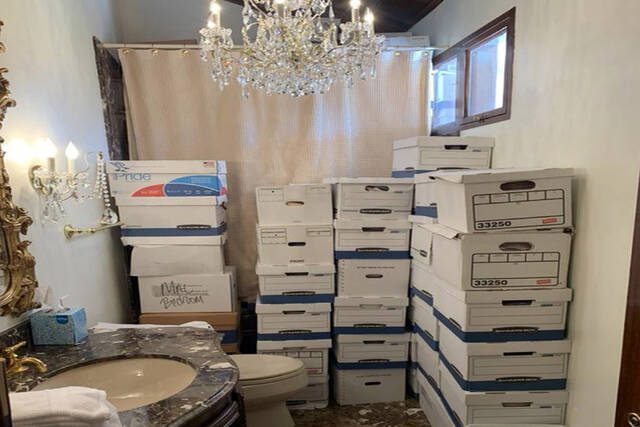FORT PIERCE, Fla. — On Thursday, a federal judge rejected Donald Trump's attempt to dismiss his classified documents criminal case and seemed doubtful about another effort to stop the prosecution before the trial.
U.S. District Judge Aileen Cannon issued a two-page order stating that while the Trump team brought up “various arguments warranting serious consideration,” a dismissal of charges was not justified. The case involves boxes of records, some highly classified, that Trump took to his Mar-a-Lago estate when he left the White House.
Cannon, who was appointed to the bench by the former president, had made it clear during over three-and-a-half hours of arguments that she was hesitant to dismiss one of the four criminal cases against the 2024 presumptive Republican presidential nominee. At one point, she mentioned that it would be “difficult to see” and “quite an extraordinary” step to strike down an Espionage Act statute that underpins most of the felony counts against Trump, which his lawyers argue is unconstitutionally unclear.
The ruling from Cannon is a small victory for special counsel Jack Smith’s team, who is pursuing a separate prosecution of Trump on charges that he planned to overturn the results of the 2020 presidential election in addition to the classified documents case.
However, it did not address when the case might go to trial and only covered one of the two arguments presented in court on Thursday. Another motion regarding whether Trump was authorized under the Presidential Records Act to keep the documents after leaving the White House is still pending, but the judge also seemed unwilling to dismiss the case on those grounds.
“It’s difficult to see how this gets you to the dismissal of an indictment,” she told a Trump lawyer.
Trump was present at Thursday’s arguments, paying close attention with his hands sometimes clasped in front of him on the defense table as his attorneys urged Cannon to dismiss the case.
This was the second hearing this month in the Florida case, which has been progressing slowly in the courts since charges were first brought last June. Cannon heard arguments on March 1 about scheduling a trial date, but has not announced one yet and did not indicate on Thursday when she might do so. Prosecutors have urged the judge to set a date for this summer. Trump’s lawyers want to postpone it until after the election.
After the hearing, Trump mentioned on his Truth Social platform the “big crowds” outside the courthouse, including supporters with flags and signs who honked their car horns in support of the ex-president. He again stated that the prosecution is a “witch hunt” inspired by President Joe Biden.
Some of Thursday’s arguments focused on the 1978 statute known as the Presidential Records Act. The law mandates that presidential documents be handed over to the National Archives and Records Administration, although former presidents may keep notes and papers created for strictly personal reasons.
According to his lawyers, he believed he had the right to consider the records he took to Mar-a-Lago as his personal belongings and to use them as he wished.
Defense lawyer Todd Blanche said that he had the original power to classify information and to manage his records as he saw fit.
The prosecutors argued that the records were clearly related to the president and not personal. They included top-secret information and documents about nuclear programs and military capabilities of the U.S. and other countries. They argue that the presidential records law was not intended to allow presidents to keep classified and top-secret documents, such as those found at Mar-a-Lago.
According to Harbach, the documents listed in the indictment are not personal records at all. They do not fit the definition of the Presidential Records Act.
Separately, Trump’s lawyers questioned a law that makes it a crime to have unauthorized retention of national defense information. This charge forms the basis of 32 of the 40 felony counts against Trump.
In defense, lawyer Emil Bove argued that the statute's ambiguity allows the Justice Department to selectively enforce it, resulting in Trump being charged while others escape prosecution. Bove pointed to a recent report criticizing President Joe Biden’s handling of classified information as proof of the law's lack of clarity.
Bove told Cannon that when a law is unclear, the court should strike it down and tell Congress to revise it.
Prosecutor Jay Bratt disagreed, stating that there is nothing unclear about the law, and Cannon noted that striking down a statute would be a significant action.
In her ruling denying the defense request, she mentioned the changing definitions of statutory terms and disputed factual issues that need a jury's decision.
Trump is accused of intentionally keeping some of the nation’s most sensitive documents at Mar-a-Lago. Prosecutors allege he instructed his lawyer to hide records, lie to the FBI about not having them, and had staff delete surveillance footage showing boxes of documents being moved around the property.
Cannon previously indicated that she believes Trump’s status as a former president sets him apart from others who have kept classified records.
After Trump's team sued the Justice Department to retrieve his records, Cannon appointed a special master to independently review the documents taken during the FBI’s search. However, a federal appeals court later overturned this appointment.
In the midst of the unprecedented case, Cannon observed that no former president had ever faced criminal charges for mishandling classified information.
But, Bratt replied, 'there was never a situation even remotely like this one.'
Trump is facing a separate federal charge in Washington for allegedly plotting to overturn the 2020 presidential election results. Trump has argued in both federal cases that he has immunity from prosecution as a president, but Cannon has not agreed to hear arguments on that claim in the documents case.
The U.S Supreme Court is set to listen to arguments on Trump's immunity claim in the election interference case next month.



